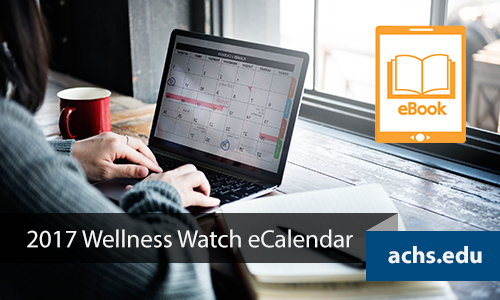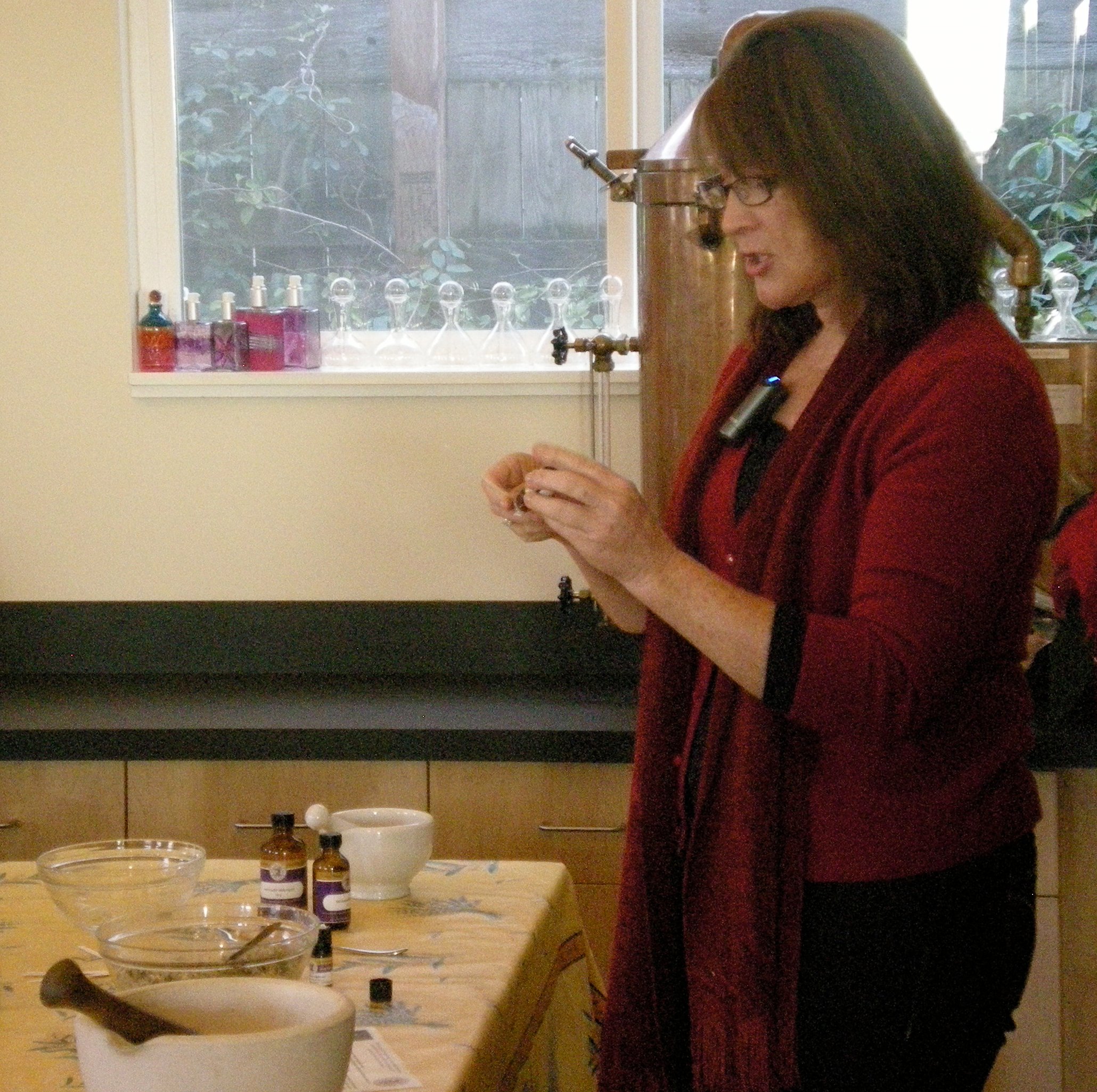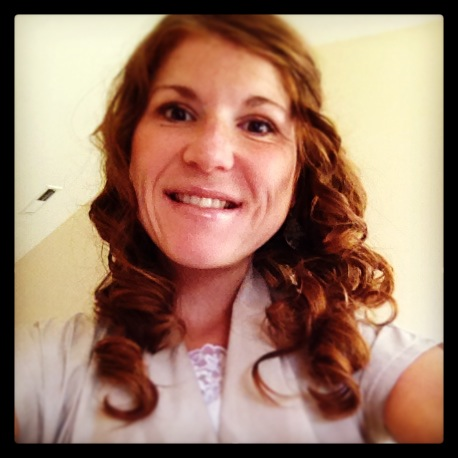Winter wellness is always a hot topic for aromatherapists. How do we provide our clients with affordable, effective solutions to winter woes during one of the most challenging (not to mention priciest!) times of the year?
It’s something I think about a lot, and especially as the holidays approach. I believe it’s important to give back to the community year-round, not just because it is a specific date on the calendar. But it especially comes into focus for me as the air shifts from the crispness of fall to the chill of winter, as holiday decorations appear around town, and as my friends, family, co-workers, and students start up with seasonal sniffles and the like.
So, the question is: how can aromatherapists reach out and help the community recharge for winter?
Here’s what I’ve come up with so far—five ways you can bring your aromatherapy business to the community while bringing some goodwill too.
#1 Speak Up—Free Community Lectures
Whether you are new to your aromatherapy practice or have a veteran career (or something somewhere in between), it’s a good time to share your knowledge.
Free community lectures are a great way to provide valuable information to many people at one time.
Just think: how many people can you reach in one 30-minute talk at your local health food store or wellness center? How many people can you reach if you give two, 15-minute talks around town?
Plus, free community lectures are a great way to meet people who may not know about your business let alone the health benefits of aromatherapy for winter wellness.
Try approaching non-“alternative” locations (e.g., the local co-op) that are open to community events and workshops, like independent coffee shops or athletic stores; some athletic stores offer free workshops on a variety of topics including health and wellness (for example, the Lululemon brand offers free community yoga classes in store). You can pitch an aromatherapy-themed class or ask if you can hand out samples!
#2 Get a Move On—Travel
Do you have any travel plans this winter? Maybe you’re going on a wellness retreat or flying to visit family for the holidays?
If you have any trips coming up, spend a little time researching the local community where you’re headed. What are their interests? What are their needs? Can you meet any of those needs? Any small gesture will make a big difference.
For example, I regularly travel in the U.S. and internationally to visit the organic herb farmers, essential oil plantations, and small boutique distillers that sustainably supply the Apothecary Shoppe, our college store at the American College of Healthcare Sciences (ACHS). Last year, my travels took me to Myanmar (Burma). And if you don’t know a lot about Myanmar, as I didn’t before researching for my trip, you might not know that mosquitoes carrying malaria and dengue fever are a big problem there.
So before I left for my trip, I made sure to make up samples of catnip Nepeta cataria (L.) hydrosol and catnip N. cataria essential oil, which can be as used as a natural insect repellent. I handed it out to whomever I came into contact with at the hotel or the local market, and even at the plantations I visited. I stayed mosquito bite free the entire time.
But I want to stress that “travel” doesn’t have to be international. For much of the year I’m in Portland, Oregon, and my daily “travel routine” involves heading from my home to the ACHS campus and back again. But, somewhere along the way, I’ll usually get into a conversation with someone about something. So, I try to keep a sample of some seasonal essential oil in my handbag because you just never know.
#3 Take It to the Streets—Mobile Health Units
Mobile health units have been providing care and services to people in need for decades. These units are typically large vans or RVs that provide basic health services at low to no cost. They do great work!
What about a mobile complementary alternative medicine/holistic health and wellness unit or mobile aromatherapy unit?
While an entire van or RV may be too much to take on, something like a food truck or a pop-up shop (or a cart!) might be highly do-able.
For example, in Atlanta, Georgia, the Herb Bus free clinic and classroom provides “free herbal care and basic first aid to underserved populations.” They are “currently hubbed in Atlanta, but also travel the country offering pop-up clinics at gatherings and facilitating workshops where we train other herbalists on the Herb Bus Method.”[1]
Just remember, it doesn’t have to be as big as a bus for it to be valuable. Start with a cart!
The Herb Bus website has a downloadable service manual on how to get started.[2] This is a great place to begin for some practical tips on how to kick-start your own aromatherapy cart, including a supplies checklist you can adapt, some first aid information, and important reminders about labeling.
Basically, you want to keep in mind the same impeccably professional practices you would adhere to in your own office space or consultancy. It’s just a change of scenery.
So, start thinking. Which essential oils and essential oil supplies would be indispensible for your aroma cart? I know my personal holistic medicine cabinet is always well-stocked with cinnamon Cinnamomum zeylanicum (Blume), clove Syzygium aromaticum (L.) Merr. & L. M. Perry, eucalyptus Eucalyptus globulus (Labill.), lavender Lavandula angustifolia (Mill.), tea tree Australia Melaleuca alternifolia (Maiden & Betche) Cheel, tea tree New Zealand Leptospermum scoparium (Forst.), and vetiver Vetiveria zizanioides (L.) Nash, so I’d start there.
#4 Meet People Where They Are—The Office
While the millennial generation has made the “alternate work schedule” famous, many of us aren’t working on our laptops from the local coffee spot. We’re in the office.
That is true for much of the allopathic healthcare community as well. So, go to where the doctors, physician’s assistants, and nurses are—the office.
Doctors see a lot of people in a day. Some of their patients may be good candidates for aromatherapy, while others may not. But either way, their waiting rooms are hotbeds for seasonal sniffles and networking opportunities.
Unfortunately, the only way to know if your doctor’s office is open to working with an aromatherapist is to ask. Fortunately, every time we ask for an opportunity, confidence grows, which creates more opportunity.
So ask. Ask if the office would be open to referral-based aromatherapy consultations or maybe something as simple as a “winter wellness” blend, a diffusor, and some brochures detailing your aromatherapy services. Ask if they want to host any free community wellness lectures or workshops. Ask if they can refer you to anyone or anywhere looking for the aromatherapy expertise you have to offer.
#5 We’re All Students—Schools
As we know, many public schools are struggling these days to make ends meet. Programs are being cut, which means services to students and the community sometimes have to be sacrificed as well, including full-time nurses and community health educators.
Do you have children in the school system? Do you have friends or family members who teach for your local schools? Can you help meet this need?
If you think this might be a good fit for you, why not volunteer to lead an evening workshop for parents who want natural solutions to support their kids’ optimal health and well-being?
Maybe you can pitch the PTA. Or, maybe you can speak with the school principle about hosting a wellness fair on campus. It can be a community fundraiser! Who’s up for a round of pin the right aroma on the right botanical?
#6 Believe in Yourself and Your Knowledge—A Bonus Pep Talk
For many, getting out there and involved can seem overwhelming, especially if you’re naturally introverted. You might also fear that asking to give workshops in unconventional places may come across as “pushy.”
My advice: remember that you have education and expertise many do not.
If you have reservations, try this: make a list of your experience, skills, and unique talents. Then, under each item, list all the ways those things can help others. Let that knowledge inspire you to put yourself out there with confidence.
Once you get started, you’ll love seeing all your hard work put into practice. As aromatherapists and holistic health practitioners, we have a duty to share our knowledge to help people live healthier, richer lives.
Happy holidays!
Endnotes
[1] For more information about the Herb Bus and the Herb Bus Method, visit their website at http://herbbus.org/
[2] You can download the Herb Bus service manual for reference on their website at http://herbbus.org/?page_id=335
Disclosure of Material Connection: I am the President and Founder of American College of Healthcare Sciences, the Institution that publishes this blog. However, all opinions are my own. This blog may contain affiliate links. I am disclosing this in accordance with the Federal Trade Commission’s 16 CFR, Part 255: “Guides Concerning the Use of Endorsements and Testimonials in Advertising.”
This article is for informational purposes only. It is not intended to treat, diagnose, cure, or prevent disease. This article has not been reviewed by the FDA. Always consult with your primary care physician or naturopathic doctor before making any significant changes to your health and wellness routine.
* This article originally appeared in NAHA’s Aromatherapy Journal Winter 2015.4 and is reprinted with permission.






